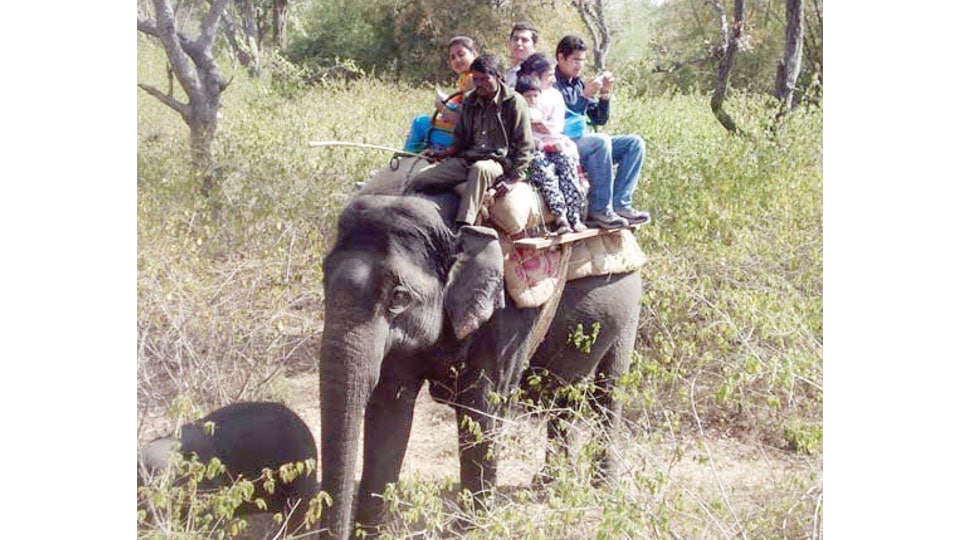By Dr. K. Javeed Nayeem
There was a report two days ago that the elephant safari at the Bandipur National Park, which had been stopped for some years, would be resumed soon. This, I am told, is to put to good use the excess number of tamed elephants that are now overcrowding the nearby Rampura elephant camp and exceeding the permissible number there. While the accommodation there is only for fifteen elephants as per a High Court directive, the camp reportedly has twenty-three elephants right now.
The elephant safari had been stopped because of some logistic difficulties at Bandipur and a lack of sufficient water to keep the pachyderms happy there. Now, with good rains over the past four years, and the sufficient availability of water, this safari is being resumed.
It was hugely popular with all visitors to Bandipur over the years as it would offer a slow and leisurely ride on elephant-back across the deeper reaches of the park to which vehicles did not have access. It resulted in better sightings too because unlike noisy vehicle safaris, it did not disturb the animals.
There were two versions of it, with one lasting just twenty minutes and the other lasting an hour. To me even the longer one used to seem too short because it used to be such an enjoyable experience. Although it is still not clear which version of it is going to be made available, it is still heartening news that this ‘Jumbo Safari’ is going to be resumed soon.
Elephant safaris which are unique to Indian wildlife sanctuaries, have always been the star attraction for wildlife enthusiasts visiting them because in addition to their novelty of recreating an experience from the days of our royalty, and because as I have already said, they invariably offer better sightings of wildlife. Their much elevated perspective, as compared to what jeeps and buses can offer, is clearly an added advantage.
The biggest benefit however, as I see it, is that because of their very limited seating and also because the riders are forewarned not to be noisy, for fear of irritating their ‘live vehicles’, they offer a very tranquil experience! You will not have any of the screaming and shouting that jar your senses and mar your pleasure the moment an animal or bird is sighted, when you are in a safari jeep or bus. So, with this kind of safari all set to reopen, I am looking forward once again to an experience that I used to immensely enjoy in the past.
On the lighter side, I would like to point out here that I once had a slightly unnerving experience when the young male elephant I was riding, instead of sticking to its traditional, trodden path, started going in pursuit of a young female that it saw grazing in the depths of the forest. Our mahout had a pretty difficult time in coaxing and cajoling it to stop being a wayward Casanova and return to its assigned, more sedate duties. It is not surprising that animals are so much like humans!
While talking of Bandipur, which enjoys a very prime location between Mysuru and Ooty, the two most sought-after tourist hubs in the region, I am sad to say that by way of the basic facilities that tourists need, it lacks them miserably. Except for those who have a reservation for accommodation, all the other tourists are left to fend for themselves, with absolutely no place to eat, rest or even relieve themselves in a time of need as they are not allowed to use the toilets close to the reception area. The result is what is inevitable.
Basic biological need overtakes modesty and decorum and you can see people peeing against tree trunks all along the road that traverses the park. The dormitories and cottages too are in a most miserable state with almost no maintenance and upkeep. The catering facilities were never good at any time and I don’t think they are any better now.
I wonder whether this sad state of affairs is deliberately orchestrated to discourage visitors, with the lofty and noble idea of not disturbing the wildlife there!
In contrast, the Mudumalai National Park, just across the Tamil Nadu border, boasts of better facilities which although basic, are much more dignified and tourist-friendly. Moreover, because they have always had an elephant safari and because their rates even for the jeep and bus safari are considerably lower than what visitors pay on this side of the border, they are doing brisk business. Our Forest and Tourism Department authorities can perhaps learn a few lessons in management from them.
Talking of men and elephants, I would like to point out another kind of interaction between the two of God’s creations. I am referring to the ongoing man-animal conflict that is raging in areas where agricultural lands abut forested areas. Although it has always been there, of late it has become the nidus of a bitter confrontation with no end in sight. It is so bad in some coffee growing areas of Kodagu and Hassan Districts that all agricultural and plantation activities have almost come to a standstill since the last three years.
People are being mauled to death by elephants on a regular basis and the fear of death haunts all those who live there. Estate workers are steadily migrating away to safer areas, badly hampering local commerce and economy.
In this very serious matter, successive Governments have all seemed to be in a state of deep slumber and have done almost nothing concrete with a sense of determination to end the problem. This already ugly situation, which when you come to think of it is actually a ‘man versus man’ conflict, between agriculturists and over-zealous animal rights activists, is all set to take an uglier turn.
While the agriculturists aver that they have the right to eke out their livelihood unmolested, on the lands they rightfully own, the animal rights activists, whose numbers are increasing, aver that animals too have a right to unmolested existence. The poor animals on their part, simply cannot understand why they cannot graze on the other side of the fence where the grass seems greener and the fruits seem so abundant and luscious. So, they think nothing of intruding onto what attracts them most. It is clearly a case of forbidden fruit always seeming more tempting and when the first man on earth could not resist it, how can we humans expect animals to keep away from it?
So, the plain truth is that animal instincts always have an upper hand, irrespective of whether they dwell in animals or humans!
e-mail: [email protected]








Hello Nayeem Saheb
Your articles are a mix of myth and reality, with more of the former than with the latter. regarding your experience of riding an elephant.
It appears you need to learn about more on elephant’s behaviour, particularly when they are tamed and working with humans. They simply do not go off chasing a female elephant,, when they are not on ‘heat’ or ‘musth’ as it is known in India. A mahout knows when a elephant is on ‘heat’ or ‘musth’,=there are clear physical indications days ahead, and hence will isolate that elephant.
Your observation of wild elephants running amuck, ws not that common before in Mysore, when it was surrounded by forests, where one could see these wild elephants going about minding their business. The human-animal conflict, you refer to is occurring because, Mysore has quadrupled its population in recent decades, the forest around have been cleared, and the habitat of these elephants have either been replaced by housing colonies or agricultural land, or both messing with elephants’ habitat they used for decades.
The solution: Indians should control their birth rate and special personal law laws for Muslims to allow them to have multiple wives, and a dozen children removed. @Nayeem Saheb, you could make a start by preaching to your community
Hey Javeed Nayeem
Wild elephants have better moral code than humans/Mysoreans. They simply do not attack the workers in those agricultural fields you mention, had these humans/Mysoreans not encroached and destroyed their abodes by clearing massive swathes of forests. India is adding one Australian population every year. The creation of Greater Mysore and the influx of people from neighbouring states soon through the highways proposed ,will further ensure more instances of infiltration of wild elephants as they are pushed further and further into depleting forest areas that they cannot live with.
The above message should have been clear in your article. Instead of tourism, you should be highlighting animal sanctuaries, not like Mudumalai , but more like the Thekkadi in Kerala, which I bet, you are unaware of, where better balance between tourists and wild animals like elephants, are maintained.
Hello Nayeem
“Basic biological need overtakes modesty and decorum and you can see people peeing against tree trunks all along the road that traverses the park”
You do not need to go to that park, to see people peeing against the tree trunks. Just take a walk in your neck of the woods-the NR Mohalla, instead of driving in a fancy car, ,you will see your fellow Mohalla dwellers peeing at the end of a road, and worse, defecating even in a small space near a road.
This is Modi’s India of ancient culture , he boasts with every foreign leader he meets.
Hi Mr nayeen
Mudumalai tiger reserve Dormitory (peacock dormitory, cuckoo guest house) are in such a pathetic condition that it’s impossible for any human being can stay there so kindly don’t recommend readers and make them struggle.